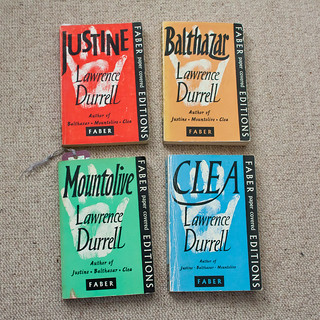To imagine is not necessarily to invent
The Alexandria Quartet
Book 2: Balthazar
by Lawrence Durrell
Rather than continuing where the previous book, Justine left off, this is instead a revisit to the same time period by the same narrator after he has learned more information. Except it’s not even just that.
The assertions and assumptions of the previous book are thoroughly shaken and the narrator proved without doubt unreliable by his own words and other people’s. Balthazar, the wise old doctor and leader of a Cabal in Alexandria, has read the narrator’s Justine manuscript and annotated it heavily, resulting in the document referred to as the Interlinear. He has included information he knew the narrator to be unaware of and remonstrations where he thinks the narrator has misrepresented a person or event. He knows that some of this, indeed much of it, will be painful for the narrator to learn of.
Despite the strange set-up, this novel is actually more straightforward than Justine, though I don’t know if it would make any sense without having read Justine shortly beforehand. The majority is made up of Balthazar’s lengthy annotations, with the narration linking or commenting on or reconstructing in-between. As before, time is not entirely linear, but events are a little more clear and a lot of hints are sown for the next book to come (I think politics and spywork may be coming slowly to the fore), as well as the occasional explanation of a puzzling detail in book one.
Because so much is in Balthazar’s voice, there is a little less musing on the beauty and life of the city, but that just makes the passages more noticeably beautiful when they come:
“The city, inhabited by these memories of mine…isolated on a slate promontory over the sea, backed only by the moonstone mirror of Mareotis, the salt lake, and its further forevers of ragged desert (now dusted softly by the spring winds into satin dunes, patternless and beautiful as cloudscapes)…”
What there is more of is confusion between the story itself and the books and manuscripts written by various characters. By this point there are, I think, four fictional authors?
Balthazar writes, “To imagine is not necessarily to invent, nor dares one make a claim for omniscience in interpreting people’s actions. One assumes they have grown out of their feelings as leaves grow out of a branch. But can one work backwards, deducing one from the other? Perhaps a writer could if he were sufficiently brave to cement these apparent gaps in our understanding with interpretations of his own…” And later, “Truth is not what is uttered in full consciousness. It is always what ‘just slips out’…”
Our narrator gets a couple of nicknames in this volume including the heavily sarcastic-sounding “Wise One”, surely an ironic comment on his inability to see the truth. Or is that the problem at all? Does he in fact understand exactly what is going on and just exclude certain details from his account? At this point I think either could be true. Possibly a bit of each.
At the end of Justine I was a little uncertain about how this story could continue for three more books, whereas now I already see plenty to fill two more books, let alone any new plot threads that might emerge. I guess this may mean it gets a bit more action-based and less cerebral. World War II does seem to be creeping closer (“rumblings in Europe” are mentioned periodically) and our narrator is a young male British citizen. I look forward to seeing whether any of my guesswork is proved right.
First published 1958 by Faber & Faber.
See also: my reviews of
Book 1: Justine
Book 3: Mountolive
Book 4: Clea

I will read this just for the lovely language and ideas.